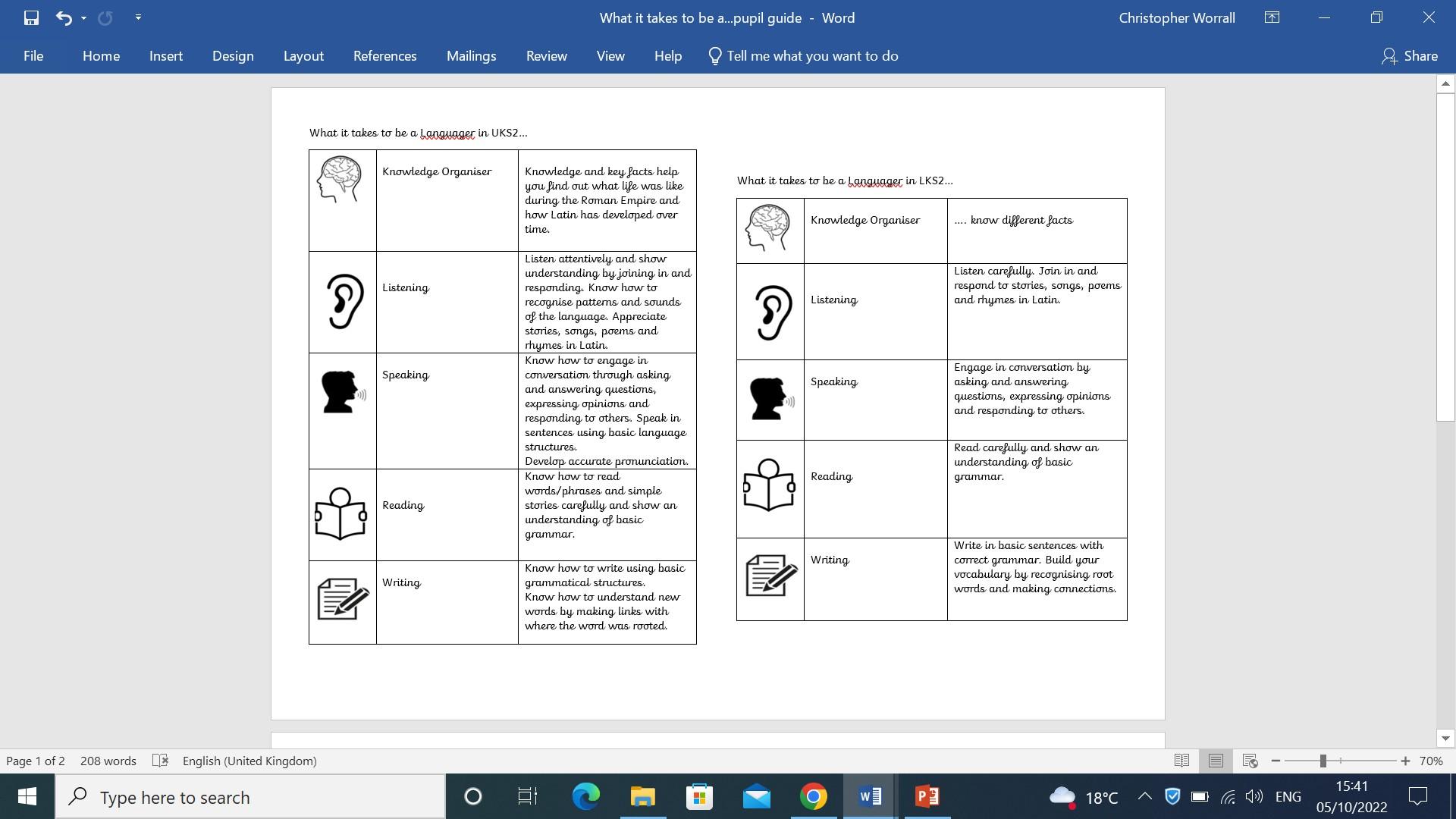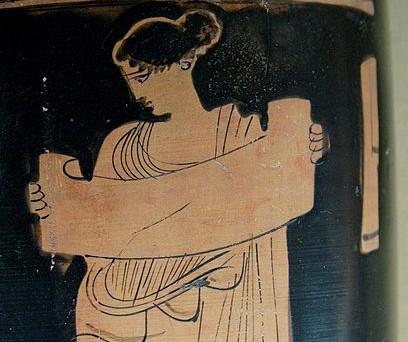

Latin
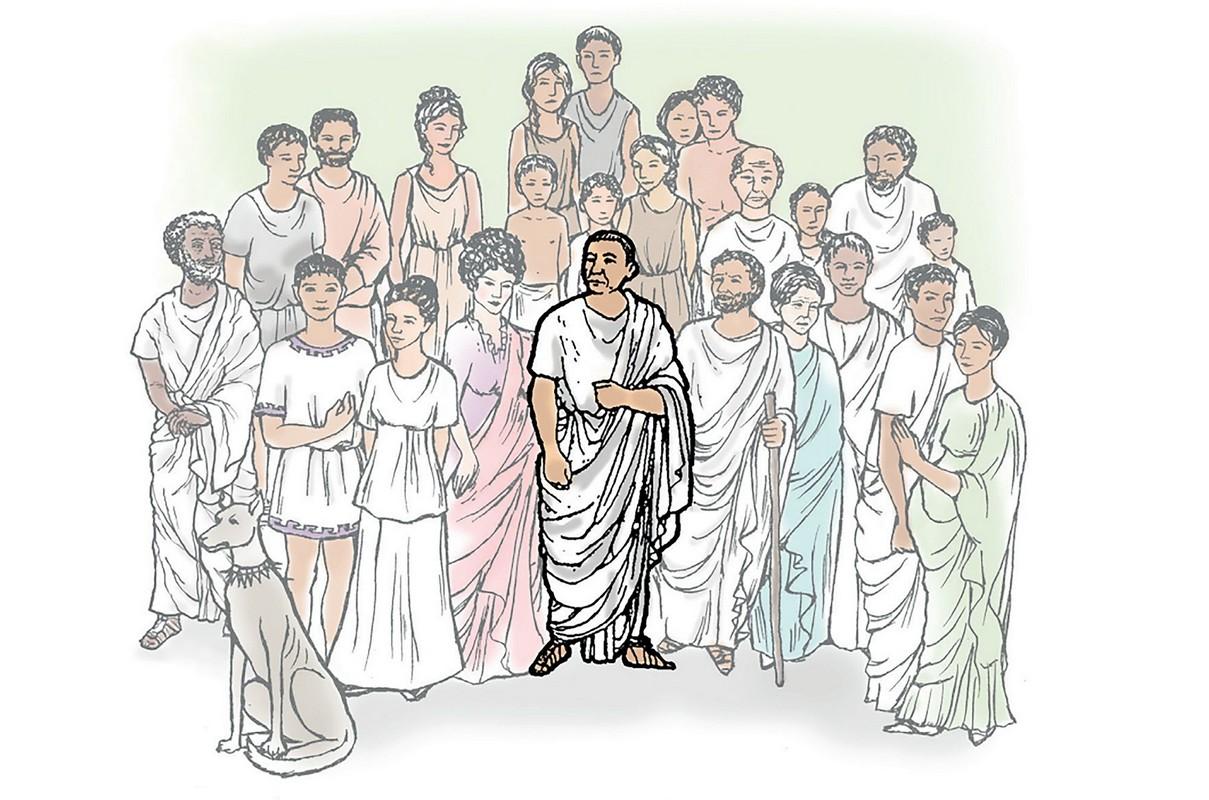
At St Anne’s we intend to give our children knowledge of the ancient Latin language to enable them to make links with global languages. Latin is a language that has formed the basis for many modern languages and the English we predominantly speak today. At St Anne’s, we believe it is vital for our children to understand where our language originated from and how it has developed over the years. By understanding the language of Latin, our children can make strong links to grammar and spelling; developing their reading and writing across all subject areas.
"If you talk to a man in a language he understands, that goes to his head. If you talk to him in his own language, that goes to his heart." - Nelson Mandela
We have adapted our curriculum to introduce the study of classics with a main focus on learning to read, write and speak Latin. We recognise this benefits our children in many ways and provide them with the tools they need to acquire language skills across the curriculum
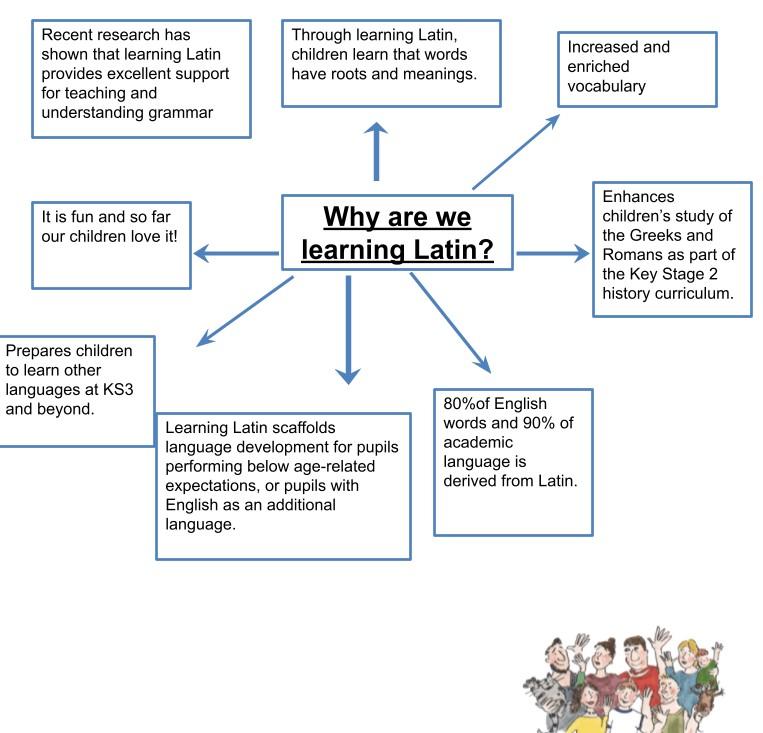
Vision: At St Anne’s Primary School, we believe it is vital for our children to understand where our language originated from and how it has developed over the years.
Our Language curriculum offers a high-quality education where pupils will gain an stronger understanding of grammar and spelling therefore helping their reading and writing across all subject areas. At our school we feel that this particularly important.
Design: Our Language curriculum is vocabulary rich, dips into exciting history myhts and legends from Ancient Greece and Rome, and structured through the Minimus scheme of teaching Latin. This enables our children to leave school with an amazing foundation for learning other languages and a better understanding of the English grammar and vocabulary that they use everyday.
Concepts: Units of work are planned carefully following the National Curriculum as well as using the threshold concepts based on Chris Quigley’s structure. This ensures our Language curriculum is coherently planned as well as being underpinned by our curriculum drivers. Every unit is planned to focus on the listening, speaking, reading and writing of Latin. They are regularly revisited and built upon through year groups and across key stages to allow our children to continue to develop and strengthen their understanding.
Vocabulary: Each topic is bursting with rich vocabulary to broaden the children’s understanding of Latin and how the words we use today are heavily rooted from the Language. Vocabulary rich knowledge organsiers support each unit of work.
Languages Intent

Topics
Latin will follow the topics set out in the Minimus scheme of work.
These will be taught with focus towards the National Curriculum and Language Intent.
They are designed to build children’s understanding of the history of Latin, whilst being relevant, engaging and meaningful as they build a wealth and depth of vocabulary through listening, speaking, reading and writing the language.
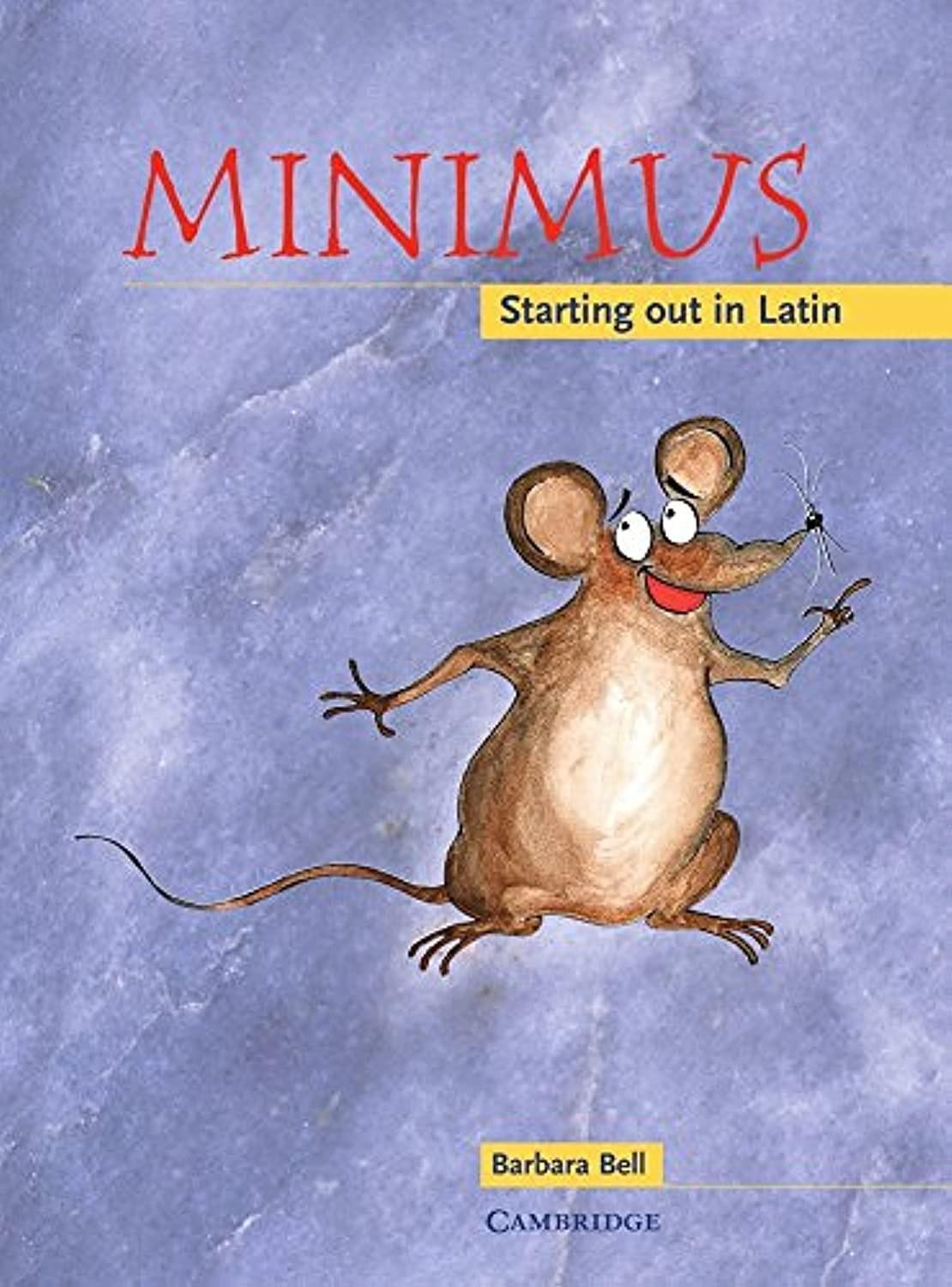
From Years 4 – 6 , children will deepen their understanding of Roman history and Ancient Greek myths, as well as expand their understanding of the Latin rooted vocabulary that we use today.
Each year (Autumn 1) begins with a revision of previous units and key learning to retrieve and embed knowledge.
As the years progress and Latin is embedded, the intent is that children will have a deep understanding of the language, Roman History and Ancient Greek Mythology, through study of the KS2 Minimus book 1.
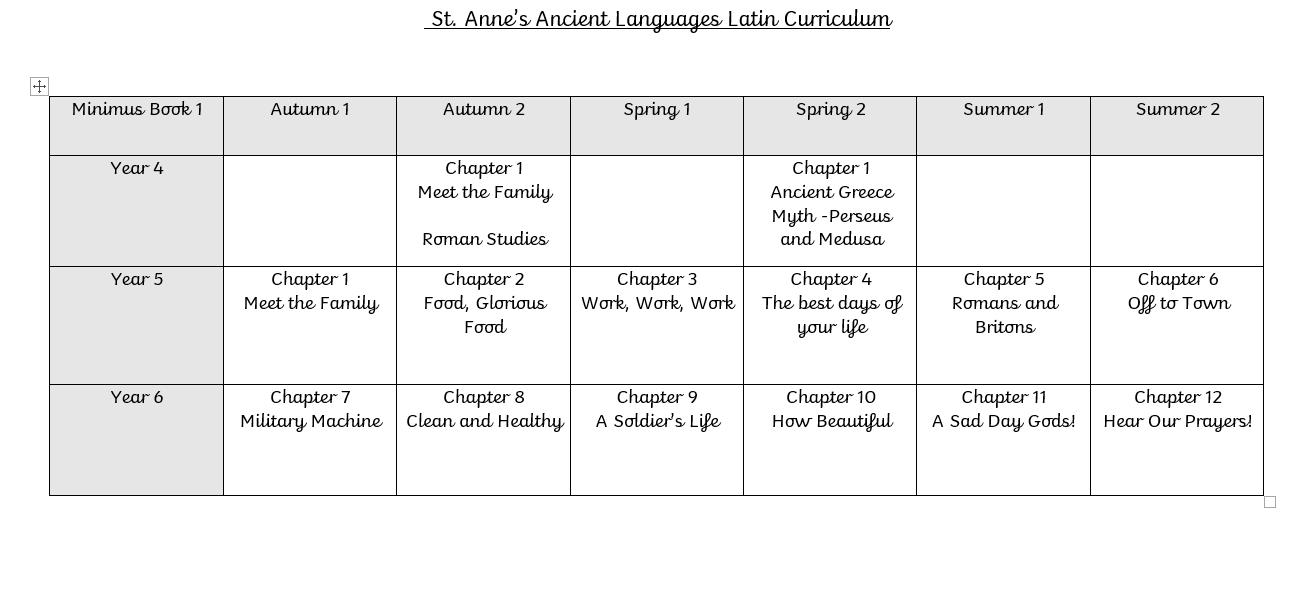
Approach to teaching Latin
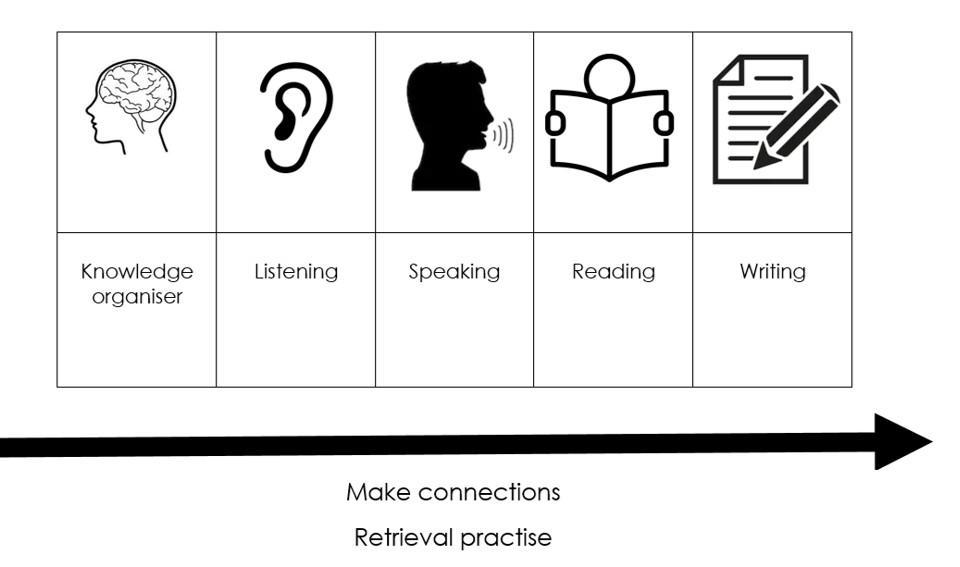
Year 4 Overview
After their study of the Romans, children will be introduced to Latin and the Minimus family through Minimus Et Cetera books and the scheme of learning; building their understanding of Roman Britain and myths from Ancient Greece. This will prepare them for future learning of Latin in UKS2 - Years 5 and 6.
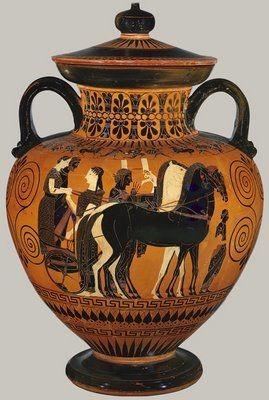
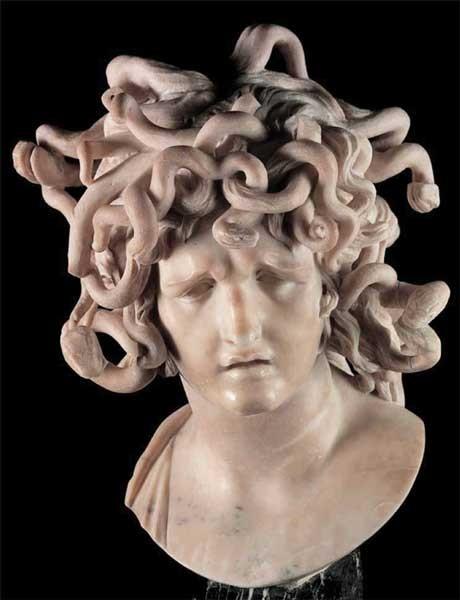
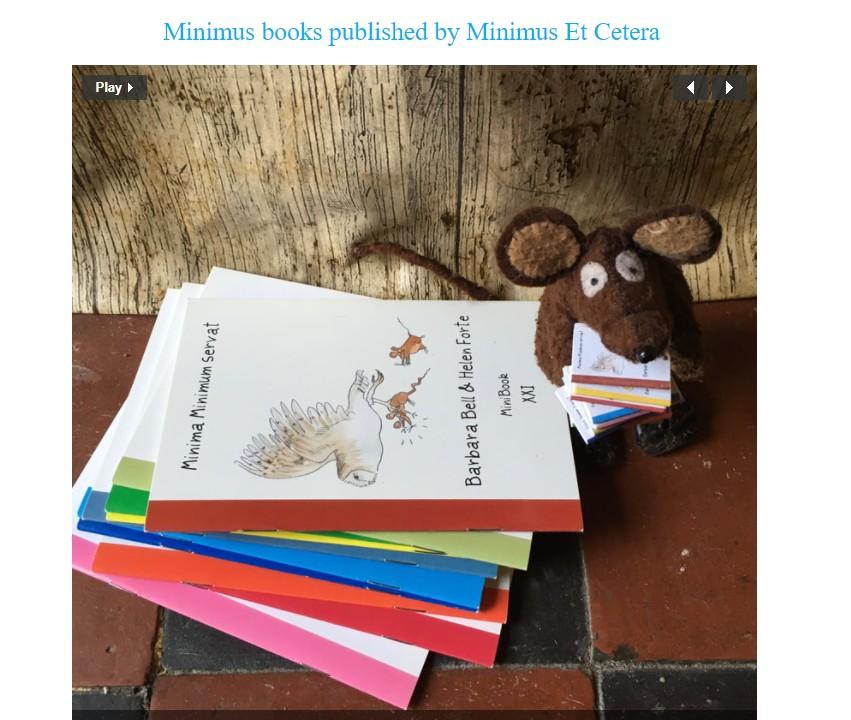
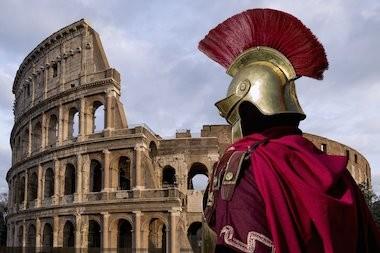
Year 4 Overview
• Children will build an understanding of the Romans in Britain.
• They will learn: nouns for the family, how to introduce themselves and common greetings in Latin.
• The children will also learn about the Ancient Greek Myth of Medusa and Perseus, linking to their history study of Ancient Greece.
• All lessons have a vocabulary and oracy focus (I say, You say) to build spoken language skills and communication in our children.
Year 5 Overview
• Children will revisit learning from the previous year; Roman Britian, the family, nouns and adjectives.
• They will be introduced to verbs and adverbs, the Roman military, Roman baths and doctors
• They will consolidate their understanding of adverbs and imperatives.
• All lessons will have a vocabulary, to build a bank of vocabulary, and an oracy focus (I say, You say) to build spoken language skills and communication in our children.
Year 6 Overview
• Children will continue to develop their understanding of the characters in the Minimus scheme and will be introduced to adverbs.
• The children will find out about the Roman Empire’s military, through their learning of Latin imperatives. And will learn about Roman baths and doctors, to consolidate their understanding of adverbs and imperatives. They will be taught about a Roman soldier’s life, whilst exploring Latin prepositions.
• In the jewellery, clothing unit, the children will be taught about Latin conjunctions. Concluding units will cover death, burial and religion, which will let the children gain an understanding of order and support related Religious Education topics.
• All lessons will have a vocabulary, to build a bank of vocabulary, and an oracy focus (I say, You say) to build spoken language skills and communication in our children.
Progression in Languages
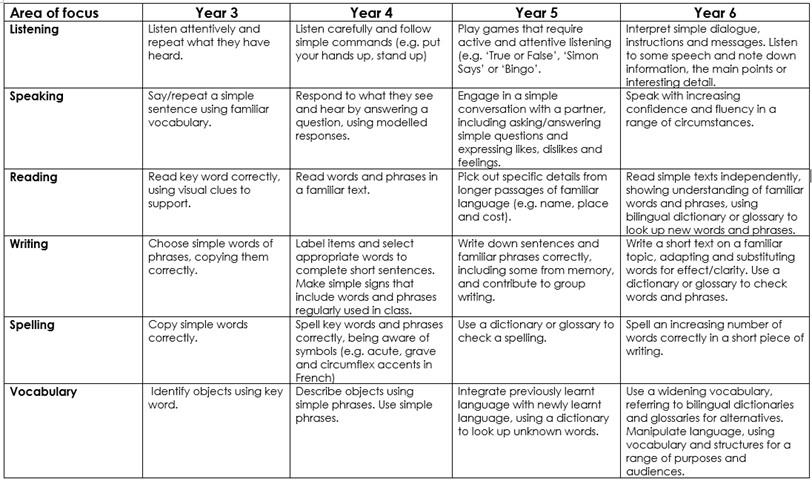
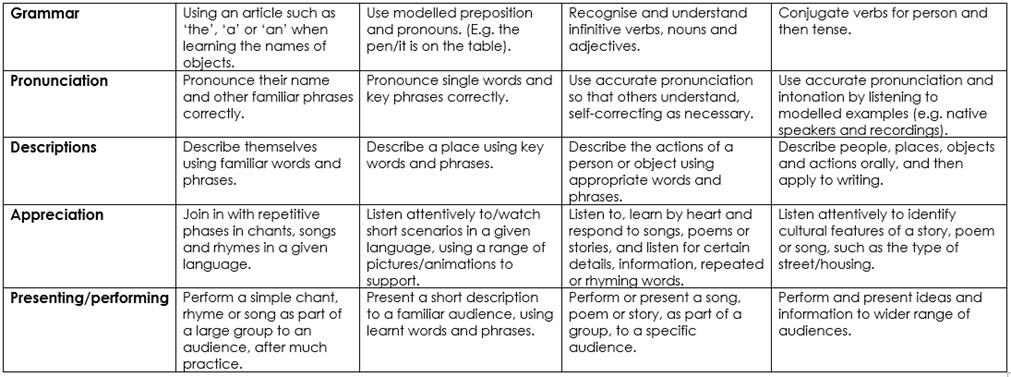
Example of Medium term plan Y6
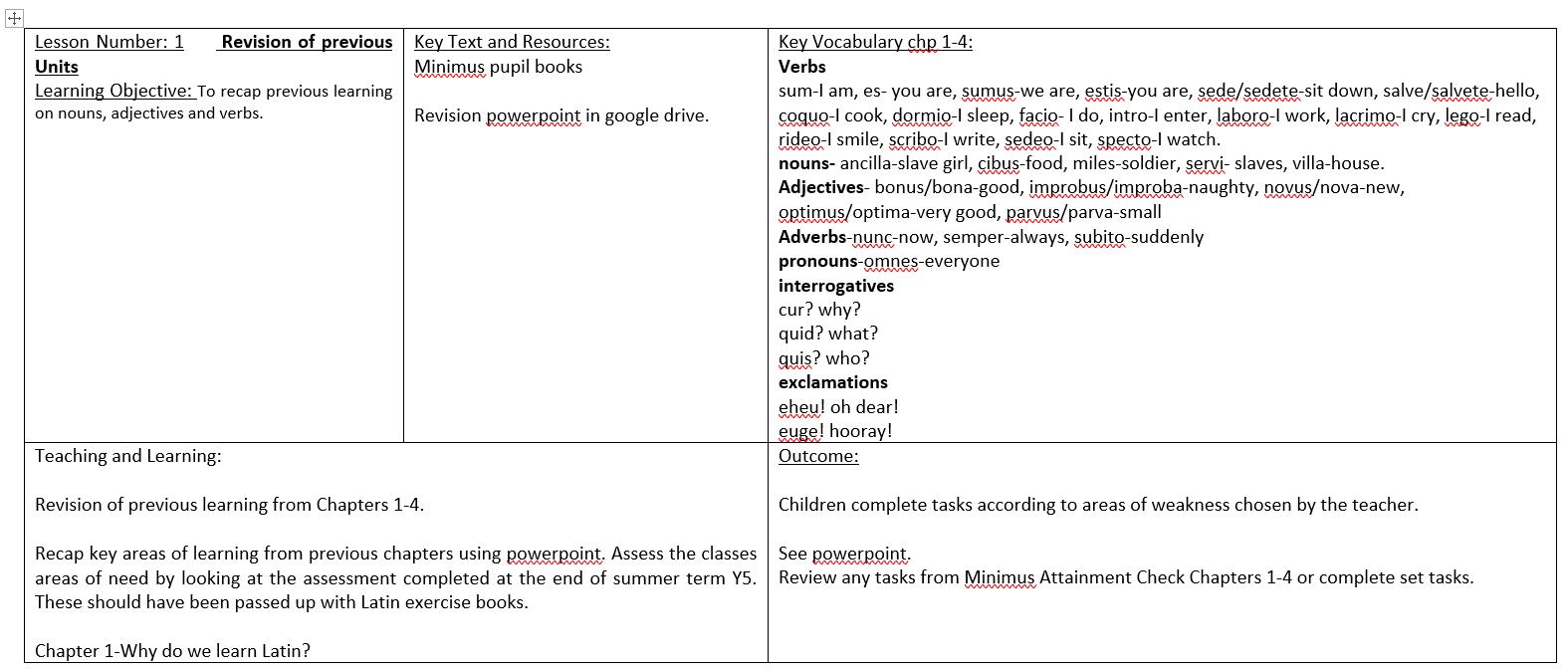

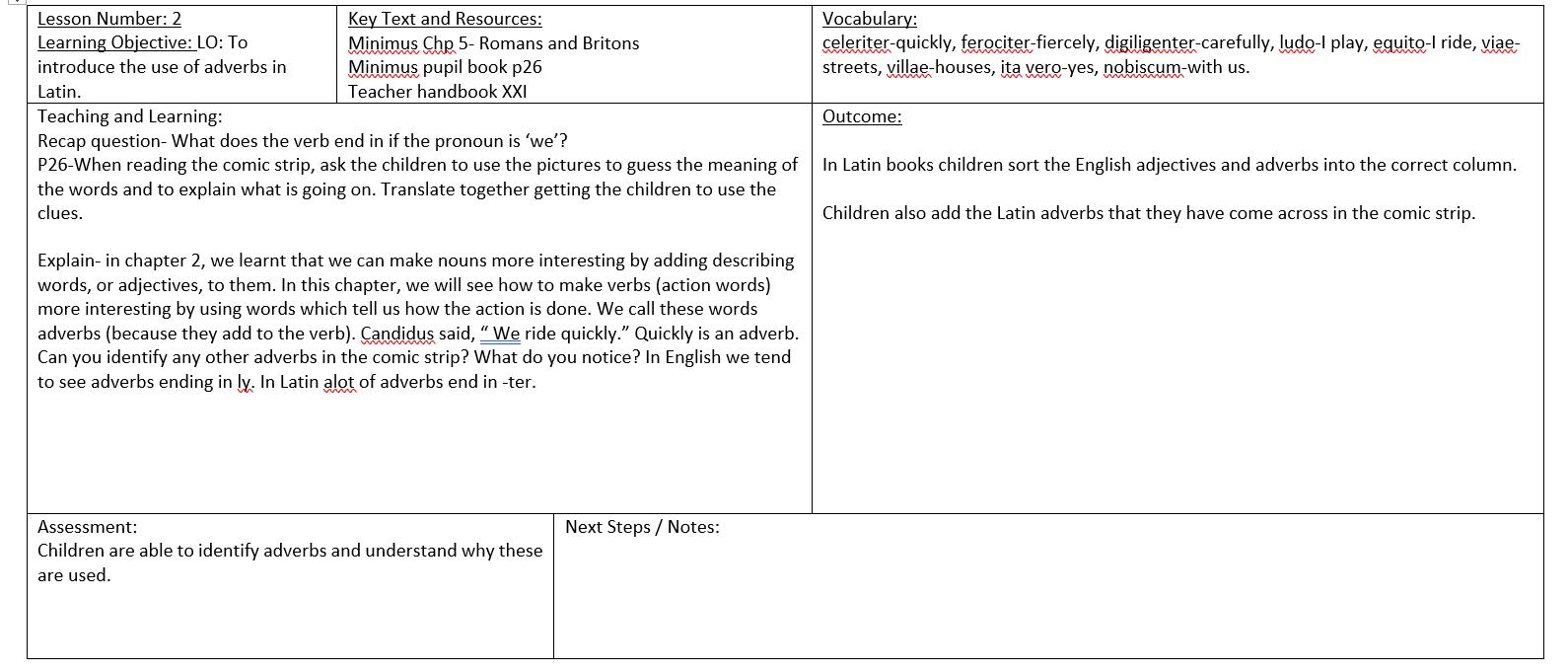
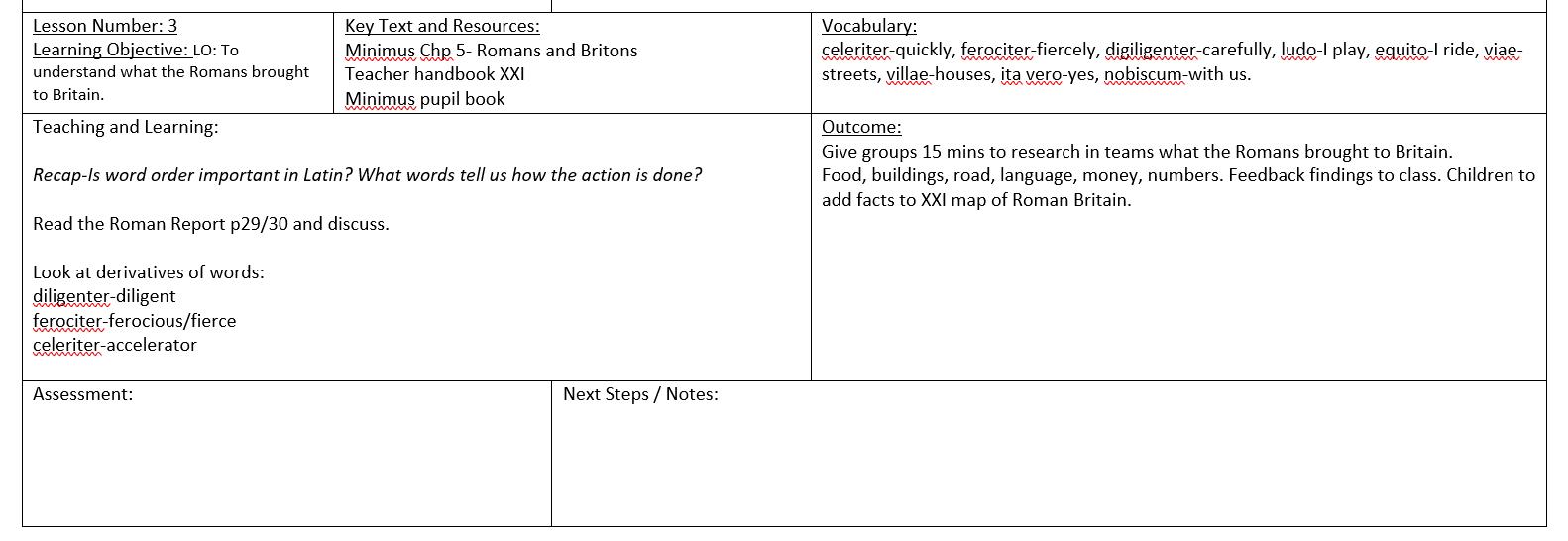

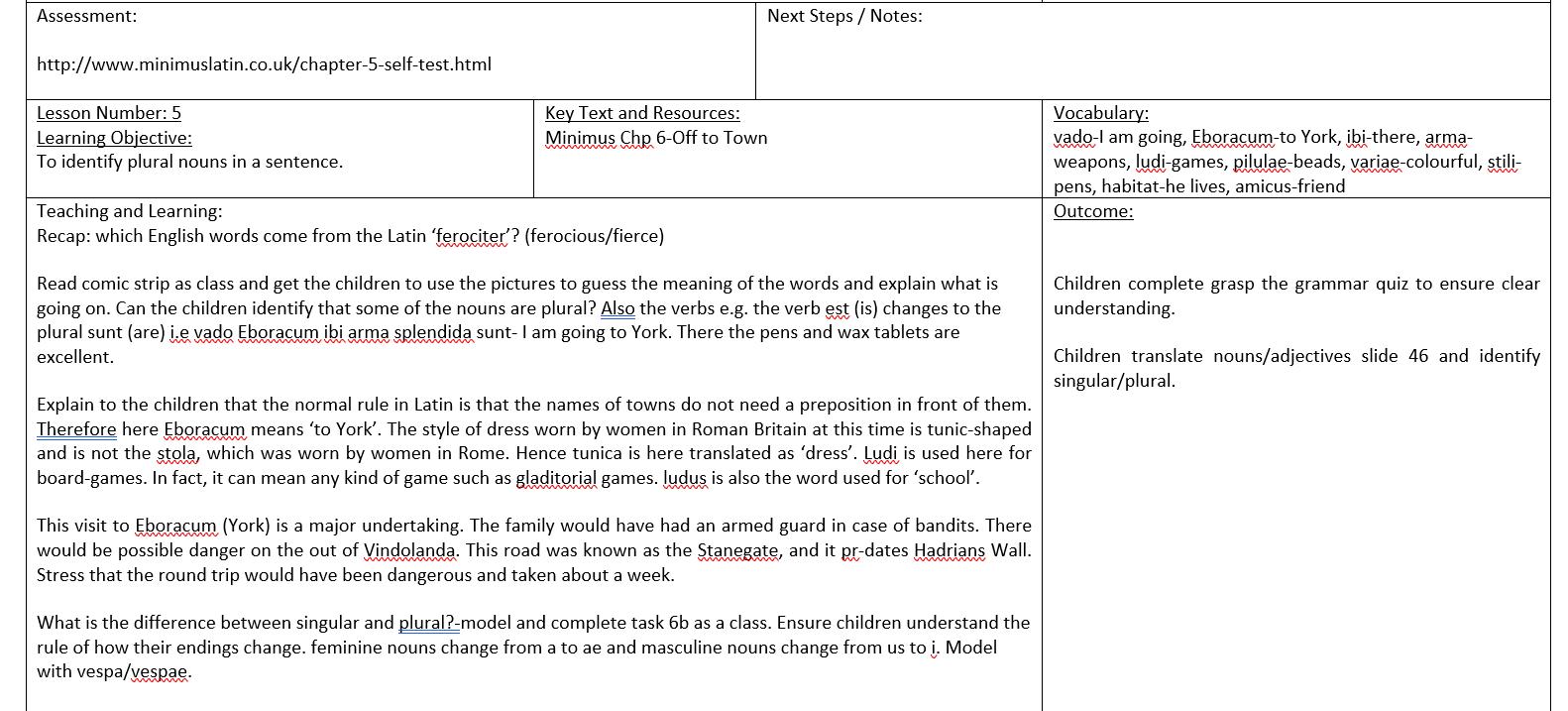
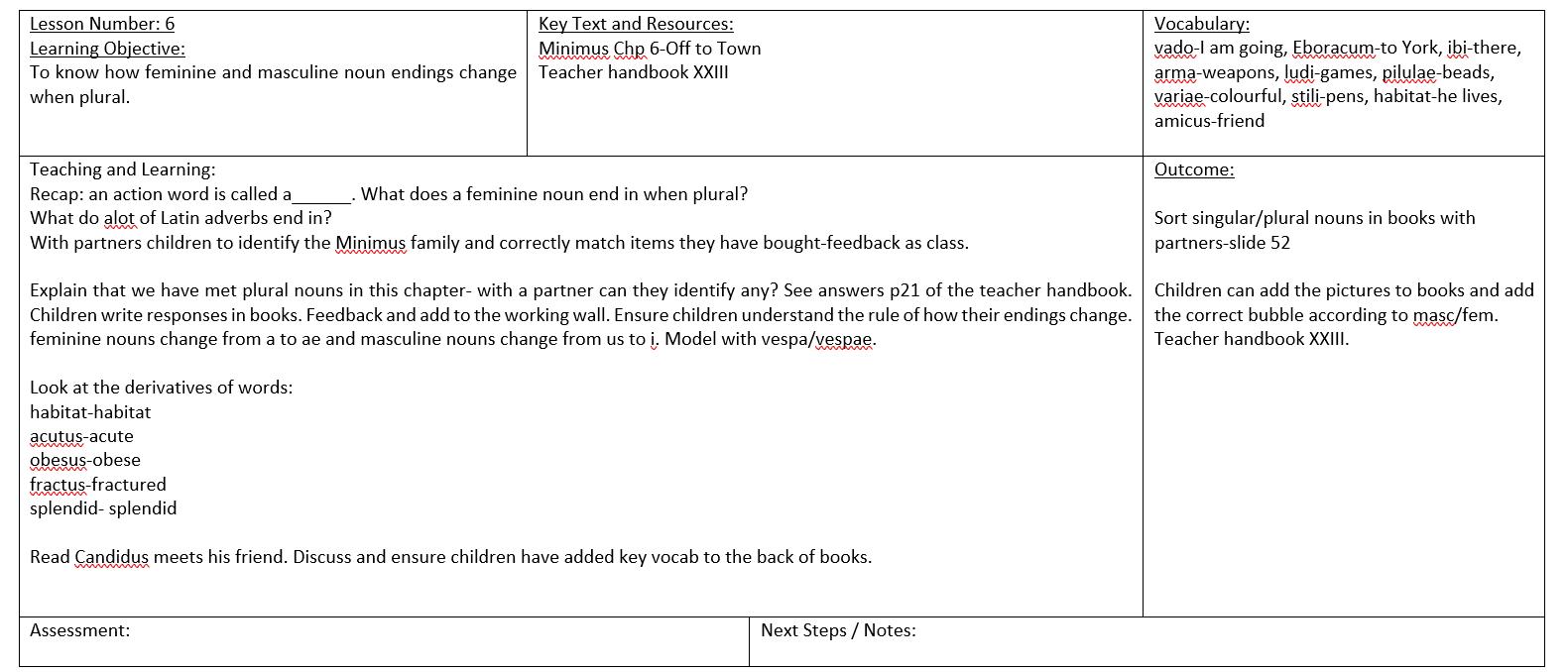
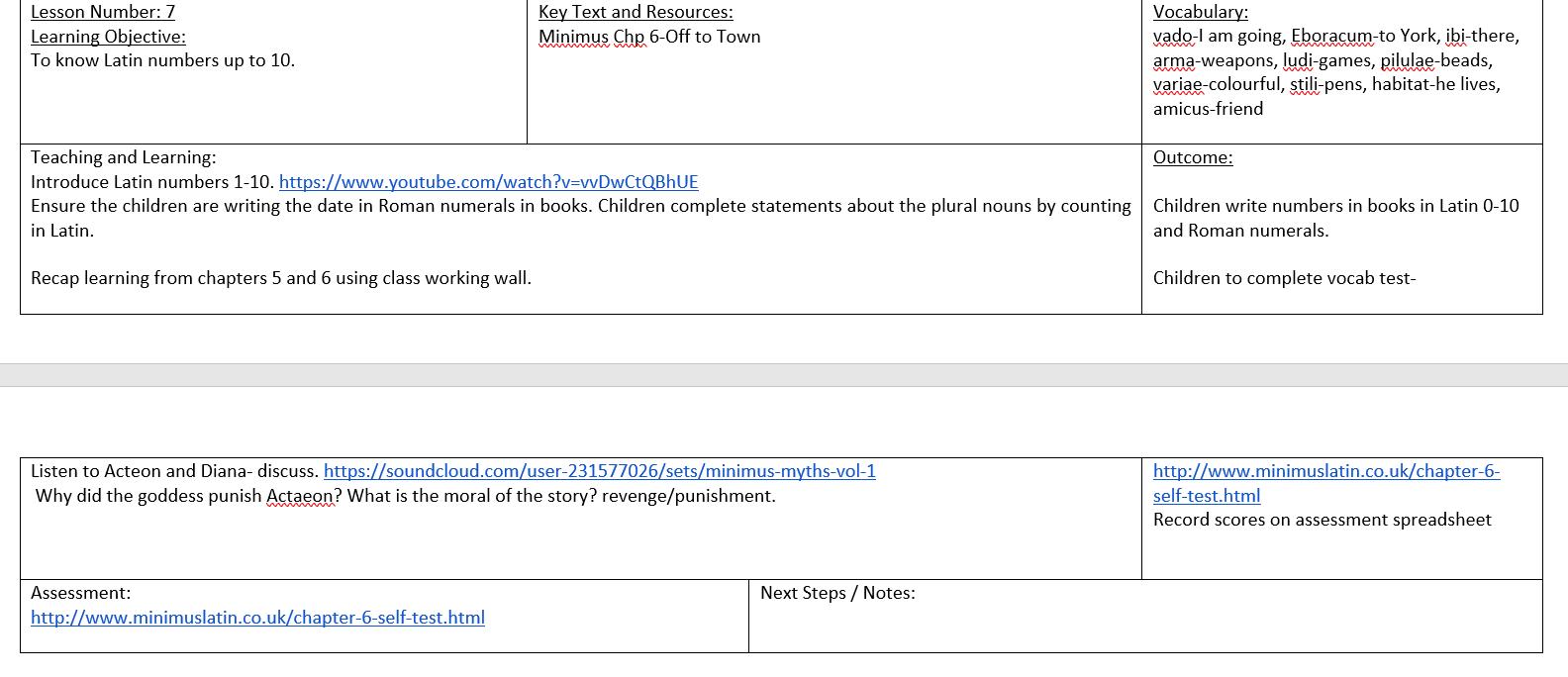
Enrichment opportunities
Performance: KS2 Latin Plays
Visits / trips: Links to other Latin teaching schools such as Mauldeth Road, Stanley Road.
Visitors: Roman Day
Celebration outcomes
● Roman day with Latin learning
● KS2 presentation of Mini Plays to other Year groups through Latin play/celebration
● Share a Latin Picture Book – The Gruffalo
Impact statement
• In lessons there are many opportunities for children to express their opinions and also share any knowledge they already have. This provides key opportunities for teachers to identify any gaps in knowledge and also assess where there may be misconceptions on the subject matter. As we are aware that many historical concepts are difficult for children, lessons feature many texts, videos, images or real examples of sources and demonstrations of the topic.
• At the end of a unit of work children will write a longer form “essay-style” answer using a structure strip to provide prompts on what needs to be discussed. These prompts will link to their learning and key knowledge of the unit, and sometimes also link in with previous topics. This is to allow children the opportunity to show what they have learnt and remembered over the topic and that information is embedded and is readily available to access in the longer term. This allows teachers to assess which information has been remembered and is available for children to use when needed at a later point in time.
• At the end of each unit, children will complete a knowledge quiz based on the “know that” statements of the topics covered that year and this provided information to the following teacher about which areas are well remembered and understood and which areas could be the focus of retrieval practice the next year.
Assessment
• Teacher assessed through lesson
• Work in exercise books
• End of Chapter Assessments
• Vocabulary Tests/ Quizzes
• Spoken Latin
• EAZMAG language objectives (national curriculum)
Support
Staff support
National curriculum
Websites
Minimus pupil book, teacher handbook and website
Medium term plans
Subject leader
Google drive folders
History and Latin books purchased
USEFUL WEBSITES FOR LATIN
• https://www.primarylatinproject.org/copy-of-useful-links-and-resources
• https://www.primarylatinproject.org/resources
• https://www.primarylatinproject.org/grants
• https://www.primarylatinproject.org/minimus
• https://www.theclassicslibrary.com/play-time-extra-a-new-collection-of-latin-plays/
• https://www.amazon.co.uk/Classroom-Tree-Bulletin-Board-Scholastic/dp/0439537886/ref=sr _1_17?dchild=1&keywords=tree+display+school&qid=1614876808&sr=8-17
• http://www.minimuslatin.co.uk/downloads-for-teachers.html
• https://docs.google.com/presentation/d/1JWH5cmkV5c8ETI9hPmTHC31M8IH6m5p5y-IF1qi gJBs/copy?usp=sharing
• http://www.minimuslatin.co.uk/fun-stuff.html
• https://classicsforall.org.uk/my-school-wants-classics/resources-0/key-stage-1-2-resources
General:
Read and Respond from Marcia Williams Greek myths Read & Respond: Greek Myths - Scholastic Shop
Marcia Williams Romans teaching notes Teacher's notes and bookings - Marcia Williams
A pronounciation guide, some KS1 flashcards, Latin conversation:
https://maximumclassics.com/et-cetera/
Read through of chapter 1 in Minimus (good for sharing but also for pronounciatio) Minimus story read-throughs – Maximum Classics
Basic pronounciation guide:
http://www.minimuslatin.co.uk/uploads/2/2/6/1/22616882/minimus_pronunciation_guide_-_short_version.pdf
Free word roots worksheets and posters KS2-3 Word Roots – Maximum Classics
Interactive Roman Name picker https://drive.google.com/file/d/1-WtQsv-J9Sm2zHp4cKmkjQ3BEeOe8Dbi/view?usp=sharing
Root words
https://membean.com/treelist
https://maximumclassics.com/ks2-3-word-roots/
Latin audio
https://www.duolingo.com/skill/la/Introduction/1
LIGHTBULB LANGUAGES
